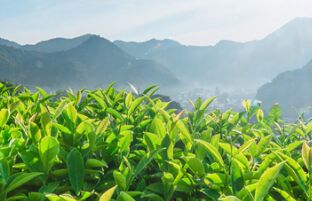哈佛最新研究:出现感冒征兆,喝红茶就好了
The colder seasons are upon us, and that means so many wonderful things: falling leaves, cozy sweaters, crackling fireplaces, and the holidays. But, unfortunately, it also means flu season.
冬季就要来临,落叶、厚毛衣、噼里啪啦的炉火、各种假期都要来了。但是,冬天也意味着流感来袭。
When your body begins showing signs of a nasty cold, like sneezing or congestion, or a whole body flu, like chills and fatigue, you might be inclined to hurry to the drugstore or your medicine cabinet to take over-the-counter meds—which may or may not work. But too often we forget about nature’s remedies for fighting the flu.
发现诸如打喷嚏、鼻塞或发抖、疲惫等流感症状时,有人可能会急忙去药店买药——通常都没用。我们总是忘记,其实有更自然的方法治疗流感。
Turns out, sipping a hot cup of tea is not only comforting while you're feeling under the weather, but according to research, it's chock-full of benefits to help you combat this season's biggest sickness.
喝杯热茶能缓解身体不适,有调查显示,热茶有满满的好处,能帮助对抗冬季流感。

According to research published in the Proceedings of the National Academy of Sciences, drinking black tea is a major immune booster. The study, out of Brigham and Women's Hospital in Boston and Harvard Medical School, found that people who drank five cups of black tea a day for two weeks saw their immune system T cells pumping out 10 times more cold and flu virus-fighting interferon.
《美国国家科学院院刊》(Proceedings of the National Academy of Sciences)有研究显示,红茶是提升免疫力的一大法宝。波士顿布列根和妇女医院(Brigham and Women's Hospital)以及哈佛医学院合作试验表明,每天喝五杯红茶,并坚持两周的人免疫系统内的T细胞能够产生十倍多的抗流感病毒干扰素。
“We worked out the molecular aspects of this tea component in the test tube and then tested it on a small number of people to see if it actually worked in human beings,” explained Jack F. Bukowski, MD, one of the study's researchers. According to Dr. Bukowski, the results are proof that five cups of tea a day can enhance the body's disease defenses. (Check out these other incredible benefits of black tea.)
研究人员医学博士杰克·F·布科思拷说:“我们用试管分析红茶的分子成分,在一小部分人身上做了实验,看是否有效。”布科思拷表示,结果证明每天喝五杯茶能提高身体的疾病提抗力。
Green tea is another noteworthy flu-fighter thanks to its antioxidant quercetin, as well as an amino acid called L-theanine. Various studies have shown that quercetin acts as a potent antiviral agent, hindering viral replication of many respiratory viruses, including influenza virus. One study, published in the Journal of Medicinal Food found quercetin to inhibit the replication of a common cold virus in its initial stage of infection.
绿茶因其含有抗氧化物质槲皮素和氨基酸茶氨酸,也能抵抗流感。多项实验表明,茶氨酸是抗病毒的潜在因素,能阻止很多呼吸道病毒复制,比如流感病毒。《药用食材期刊》(Journal of Medicinal Food )做过实验,发现茶氨酸可以在感冒病毒感染初期抑制病毒复制。
A study completed by researchers at University of Florida and the Nutritional Science Research Institute and published in the Journal of the American College of Nutrition found that L-theanine and decaffeinated green tea catechins are capable of boosting the body’s immune system. The results suggest that green tea can decrease the incidence and duration of cold and flu symptoms.
佛罗里达大学和营养科学研究院(Nutritional Science Research Institute)合作进行了一项实验,结果发表在《美国营养学院期刊》上。实验表明,茶氨酸和去咖啡因的绿茶儿茶酚都能提高人体免疫力。绿茶能降低感冒和流感症状发生的可能性,也能缩短症状周期。
“With this study, we were able to show that ingestion of a specific combination of decaffeinated tea polyphenols standardized to 45 percent EGCg and L-theanine, would enhance systemic immunity, and prevent cold and flu symptoms in healthy individuals. This is a significant finding,” said lead study author Susan S. Percival, PhD.
实验主创苏珊·S·皮思温博士说:“我们在这个实验中发现,摄入去咖啡因茶多酚中45%的茶多酚和儿茶酚,能够提高免疫力,帮助健康的人抵抗感冒和流感。这项发现意义重大。”
The benefits of tea have long been accounted for, but it is easy to forget that a soothing cup does more than just satisfy you—it can prevent against pesky, and sometimes life-threatening, viruses like the flu.
茶的好处源远流长,但是却不止于此,茶还能防止讨厌的流感病毒,有时候这些病毒甚至带有致命风险。